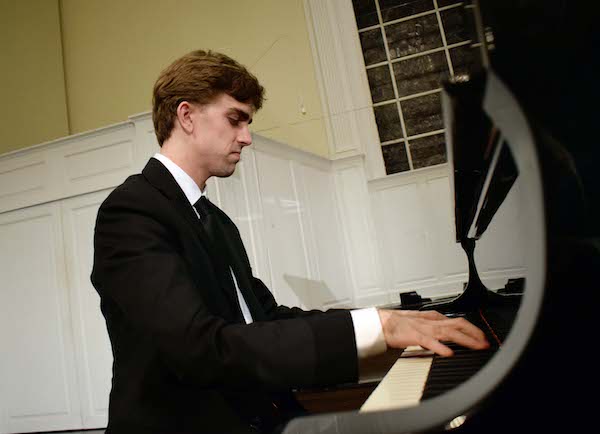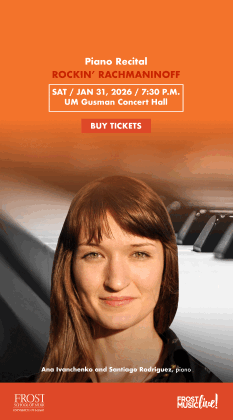Tetzloff traces the influence of Beethoven with thoughtful virtuosity

Ludwig van Beethoven changed the course of music history. The titan from Bonn’s boldly original scores have echoed through the centuries and inspired countless composers to pay tribute, both directly and through thematic metamorphosis of his creations.
Kaleidoscope MusArt’s program “Beethoven in the New World” on Thursday night at Granada Presbyterian Church in Coral Gables illustrated the historical influence of that seminal genius on artists past and present. The formidably gifted American pianist Reed Tetzloff’s recital avoided the most obvious and overplayed works in favor of the new and the challenging.
Born in Calcutta in 1945, Clarence Barlow studied with avant-garde icon Karlheinz Stockhausen, taught at the famous Darmstadt Summer Course for New Music, developed computer music software and installations and worked in the computer music studios of Paris’ IRCAM and Chicago’s Northwestern University. His scores are strongly influenced by the relationship of music to mathematic, phonetic speech and science.
These wide-ranging interests are fully evident in Barlow’s No. V: Three Bagatelles, in which three Beethoven melodies are constantly recycled simultaneously between the bass line, accompaniment and main theme. “Für Elise” is treated to wildly creative embellishments and the rumbling bass beneath the iconic first movement melody of the Moonlight Sonata adds a touch of wit. The humor and constantly surprising musical turns of Barlow’s pastiche is like Beethoven filtered through the mind of John Cage. Tetzloff approached this startling creation with big-boned intensity and extremes of volume in tonal shadings that encompassed beauty and pounding fury in equal measure.
American composer Jonathan Dawe studied at the Juilliard School with Milton Babbitt and is now a faculty member of that elite conservatory. His Ten Bagatelles (2013) offer modernist updates of Beethoven’s pianistic vignettes. Wild harmonics, blues, jazz and improvisation all enhance Dawe’s tremendously entertaining suite. The nonstop energy of “Quarter Not=120”(No. 2) and the moody tone painting of the Andante (No. 3) are particularly distinguished. Tetzloff’s rock-solid technique was put to the test in Dawe’s daunting cameos but he also was also eloquent in the final two, more lyric sections.
(The Barlow and Dawe works were winners of Kaleidoscope MuArt’s 2020 Call for Scores titled “Bagatelles for Beethoven.” Inesa Gegprifti, an adjunct faculty member at the UM Frost School of Music and a critic for South Florida Classical Review, is president of Kaleidoscope MusArt.)
Tetzloff’s reading of Beethoven’s Sonata No. 28 in A Major, Op. 101 was deeply reflective and illuminating. This first sonata of Beethoven’s late period finds its creator in his most experimental and striking mode. The serene introduction to the first movement was taken slowly, allowing a natural flow and pulse to the Allegretto, ma non troppo. Quirky accents at rapid pace fully captured the spirit of the Vivace alla marcia. Tetzloff’s unconventional interpretive approach proved diverting in its sheer extremes. Like the slow movements of Beethoven’s late string quartets, the Adagio, ma non troppo, con affetto seems to transcend earthly time and space. Played with expansive range and luminous tone, Tetzloff captured the music’s stillness and pathos. There was boisterous spirit and rhythmic buoyancy in the final Allegro. The fugal voices were fully transparent under Tetzloff’s agile fingers.
Any performance of Charles Ives’ Sonata No. 2 (“Concord”) is an event. Tetzloff called Ives “the founding father of American music” in pre-performance remarks. He certainly was an American original and no work quite illustrates Ives’ collage of thorny modernist strokes, church hymns and patriotic songs and marches quite like the Concord. Add repeated quotes from Beethoven’s 5th Symphony and Ives’ own idiosyncratic paths and you have a one-of-a-kind musical bouillabaisse.
Paying tribute to New England’s Transcendentalist writers, Ives launches the initial” Emerson” movement with hammer-like dissonant chords that have not lost their ability to shock over 100 years after the score’s genesis. Here and in the scherzo-like “Hawthorne” section, Tetzloff was fully equal to the music’s Herculean demands. The repose of the lyrical interludes was tinged with bitters, which made the hard-driving volleys that much more effective.
“The Alcotts,” the sonata’s third movement, paints a quiet scene of Louisa May Alcott and her sisters and parents practicing at the piano. Replete with wrong notes, Ives’ portrait streams with homespun charm and nobility. Tetzloff’s wonderfully varied gradations of softness and high volume matched the intimacy of Ives’ vision.
From the mystery of the first bars of the concluding “Thoreau” movement, Ives seems to embody the spirit of Transcendentalism in sound. As in many of Beethoven’s late works, the music seems to reach a higher plane of existence in its beauty and originality. Tetzloff brought almost symphonic sonority to these extraordinary final pages.
For an encore, Tetzloff infused Schumann’s Arabesque in C Major with verve while bringing a stately line to the contrasting episodes. Like the late Peter Serkin, Tetzloff is an artist of broad musical tastes and individuality. One looks forward to hearing more from this fascinating interpreter.
Kaleidoscope MusArt will stream the entire concert 5 p.m. October 9 with a live Q & A following the performance featuring Reed Tetzloff, Clarence Barlow and Jonathan Dawe. The stream is free but registration is required at KMA21Demio. kaleidoscopemusart.com
Posted in Uncategorized
One Response to “Tetzloff traces the influence of Beethoven with thoughtful virtuosity”
Leave a Comment
Fri Sep 24, 2021
at 2:52 pm
1 Comment






Posted Sep 24, 2021 at 3:21 pm by Frank Cooper
Excellent coverage of an event worth remarking! Critic Budmen’s account parallel’s this attendee’s experience and opinion.